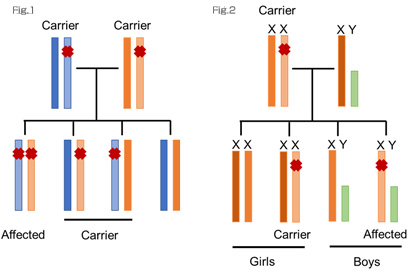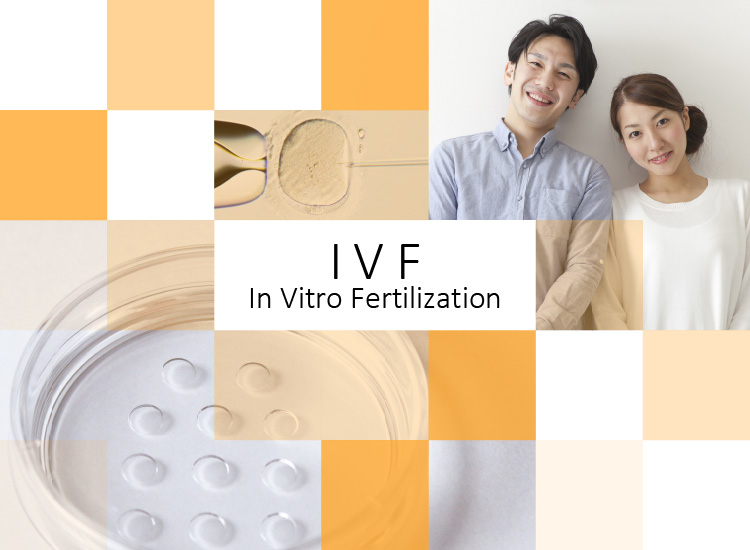Test Targets for Pre-Pregnancy Genetic Test
All couples who wish to have a baby.
This test is especially recommended for couples;
-
Who have a genetic disorder in the family or close relatives.
-
Who have a family member or a close relative who has died of a genetic disease.
-
Who already know that you or your partner is suffering from or a carrier of a genetic disease.
Who is a Carrier?
A carrier is the person who has a genetical change called a mutation that disrupts the function of an autosomal recessive (AR) gene, such as phenylketonuria, but does not develop a genetic disease.
We have a pair of chromosomes or genomes.
Thus, a person who carries a gene with a mutation that causes a hereditary disease but does not develop the disease because he or she has a normal gene at the same time is called a carrier.
If two carriers of an autosomal recessive inherited disorder happen to couple together, their children have a 25% chance of carrying only the gene that causes the hereditary disorder and, as a result, developing the disorder. There is also a 50% chance that the child will be a carrier. (Fig1)

Also, in X-linked recessive inherited disorders such as red-green dysfunction and hemophilia, if the mother is a carrier, there is a 50% chance that the boy will have only the normal gene. Girls have a 50% chance of becoming carriers. (Fig2)
Appearance and general tests cannot distinguish whether you are a carrier or have a pair of normal genes.
Therefore, in carrier screening, it is directly examined whether there is a mutation in the gene.
Percentage of carriers
According to the previous studies, we have about 2.8 mutations as a carrier in genetic disease genes (*2).
The other study showed around one in four people are a carrier of one of the 108 studied genes.
And that one in twenty are a carrier of multiple mutations (*3).
Because it became clear that the percentage of carriers is high, the American College of Obstetricians and Gynecologists recommend this screening test is offered to all couples considering pregnancy (*4).
Contents of Pre-Pregnancy Genetic Test
The 2000 genes that cover the most relevant disease-causing variants are sequenced by the NGS (Next Generation Sequencer).
These sequences show both you are a carrier or not and if there is a risk that your child can develop a genetic disease (*1,5).
Until now, carrier screening was done by sequencing whole genome or all exons.
So, the cost was very high, it took a long time to get the result and was not popular.
But this carrier screening dramatically reduced both the costs and the time to get the result by selecting the gene to be tested.
2000 Gene Selection Criteria
The 2000 genes were selected based on the following criteria.
-
A high carrier frequency.
-
An early onset disease.
-
A highly severe phenotype.
-
A severe effect on the quality.
These 2000 genes cover most relevant disease-causing variants from HGMD2017.4 that is a collection of human variants.
Specimen
About 10 ml of blood drawn from the vein is used for this test.
Inspection Period
Genetic counseling is required before the screening procedures.
So, if you wish to take this test, please ask our staff and make a reservation.
After the drawing, it will take approximately about a month and a half to receive the screening results.
Your doctor will explain the results to you.
In the cases where the variants related to the genetic disorders are found
If it has shown that both you and your partner are carriers of the same disorder. or either you or your partner has the dominant disease mutation, there are some options to consider.
(1)Preimplantation Genetic Diagnosis (PGD, or PGT-M). This screening selects embryos that will not develop genetic disorders to be transferred.
(2) Donor oocytes or sperm. By using donor oocytes or sperm, it is possible to avoid genetic diseases.
However, the Japan Society of Obstetrics and Gynecology is allowing PGD and IVF with donor oocytes or sperm only under limited conditions. Please ask our staff for more detailed information.
The baby with some kind of genetic disorder can have normal development if the appropriate treatment is started as soon as possible. So, if you know the risk of your baby having such a genetic disease, you can have time to prepare for it.
Cost
|
|
Inspection Fee
|
Blood
Collection Fee
|
|
Before Tax
|
Including Tax
|
|
For one person
|
CGT
plus
|
¥100,500
|
¥110,550
|
¥500
|
|
CGT
exome
|
¥114,786
|
¥126,264
|
|
For couples
|
CGT
plus
|
¥143,857
|
¥158,243
|
¥1,000
|
|
CGT
exome
|
¥172,429
|
¥189,671
|
*The price may change without notice.
*1 Even if you have no the variants related to genetic diseases or not a carrier as the result of this screening test, there is still a chance that your children develop genetic disorders due to technical limitations or mutations that occurred during the gene replication.
Children might develop genetic diseases or congenital abnormalities due to mutations of genes not included in this test, structural abnormalities of chromosomes, other causes of current unknown etc.
*2
Carrier Testing for Severe Childhood Recessive Diseases by Next-Generation Sequencing. Bell CJ, at al. (2011) SciTranslMed. 3(65):65ar4
*3
An empirical estimate of carrier frequencies for 400+ causal Mendelian variants: results from an ethnically diverse clinical sample of 23,453 individuals., Lazarin GA, et al. (2013) GenetMed. 15(3):178-86
*4
Carrier Screening for Genetic Conditions. ACOG Committee Opinion Number 691, March 2017
*5 This carrier screening test may reveal that the patient who has this test has the risk of developing or will develop a genetic disease.









